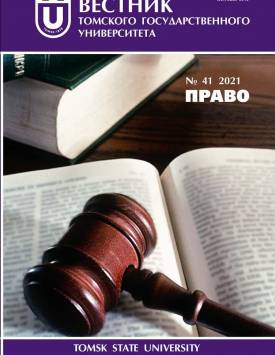Formal and evaluative characteristics of crimes committed in the sphere of economic activity
In the article, the author consider the theoretical positions on the rules for the qualification of crimes in the field of economic activity. The author consider the judicial practice in criminal cases and formulates conclusions about the characteristics of the elements (signs) of corpus delicti (see also - delicti) set out in the dispositions of articles of Chapter 22 of the Criminal code of the Russian Federation. One of the objectives of the article is to consider formal and informal elements as content (context) delicti. At the same time, the author note that the formality or informality of signs (context) delicti has no legal significance. This conclusion follows from the provision that all the signs described in the norm of the Special part of the Criminal code of the Russian Federation are legally mandatory. It is important to differentiate between elements of crimes in order to qualify crimes, especially those committed in the sphere of economic activity. The author notes that the dispositions of articles of the Special part of the Criminal code of the Russian Federation can combine elements of blankness, descriptive and evaluative. The author notes the accessory nature of criminal law from positive (regulatory) legal regulations, and the absence of concentration of legal sources. The author emphasized that the norms of the Special part of Criminal law contain two parts. The first part contains a description of the object of the crime, which the offender attempt on. Such an object is represented in the form of a legal order established by the norms of regulatory legislation. The author considers the fact of attempt on this law and order as event (hypothesis) of criminal liability. Clarification of this hypothesis take place in the process of qualifying crimes (in the sphere of criminal law application). Together, these parts of the disposition of the criminal law norm form a common whole, which indicate the legislator's idea of a criminal law prohibition. The article emphasizes the intersectoral nature of the institution of formulating grounds for criminal liability for crimes in the sphere of economic activity. The author identifies the types of evaluation signs delicti of economic crimes: quantitative (size), qualitative (can not be measured by cost) and cumulative. The author comes to the conclusion that it is expedient to further study the concept, types and role of evaluative signs of crimes. The role of evaluation signs is stated in the formulation of criminal law prohibitions. The author makes the following conclusions for the readers' discussion: the formulation of signs of crimes in the sphere of economic activity is based on the blank dispositions of the corresponding articles; a separate type of such description of the disposition is administrative prejudice; this administrative prejudice relates the grounds for criminal liability of a person for the act with his previous administrative penalty; assessment signs of the crime is determined not only by the normative legal act, judicial practice, but also in the process of qualification of a crime is determined by the consciousness of a person when it examines the being of the case.
Keywords
judicial practice, law, crime, disposition, norm, qualificationAuthors
| Name | Organization | |
| Truntsevsky Yuri V. | Institute of Legislation and Comparative Law under the Government of the Russian Federation; Academy of Management of the Ministry of Internal Affairs of Russia | trunzev@yandex.ru |
References

Formal and evaluative characteristics of crimes committed in the sphere of economic activity | Tomsk State University Journal of Law. 2021. № 41. DOI: 10.17223/22253513/41/8
